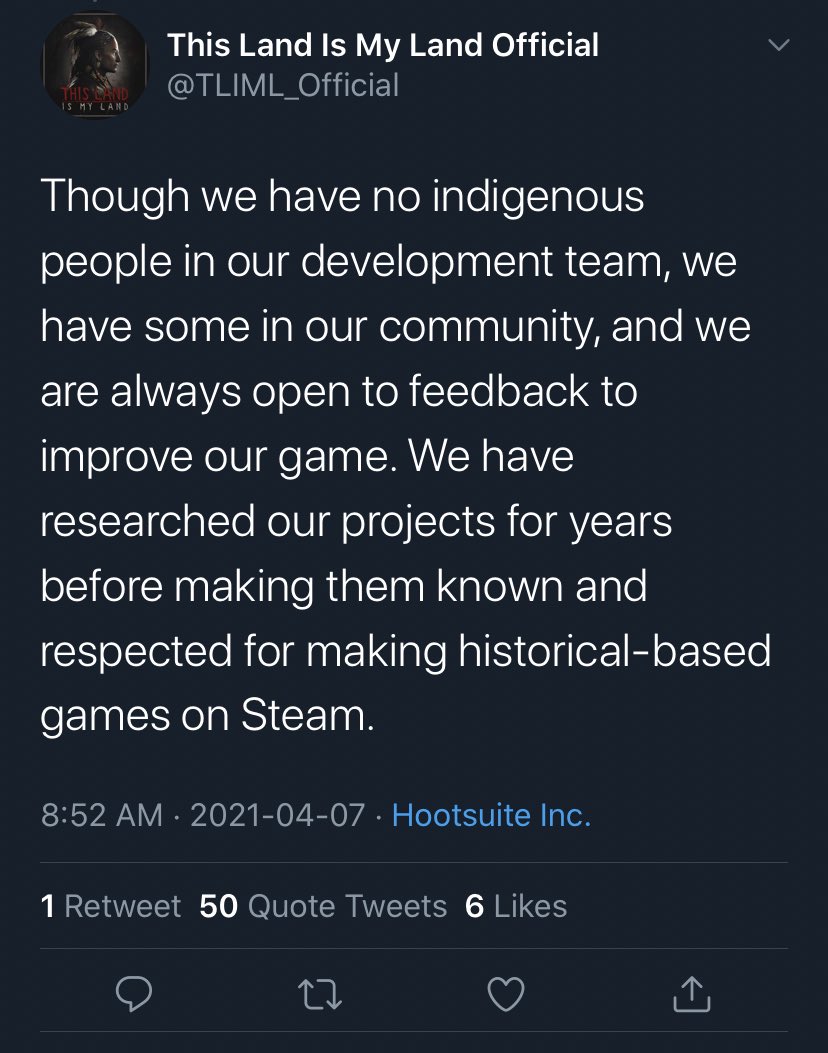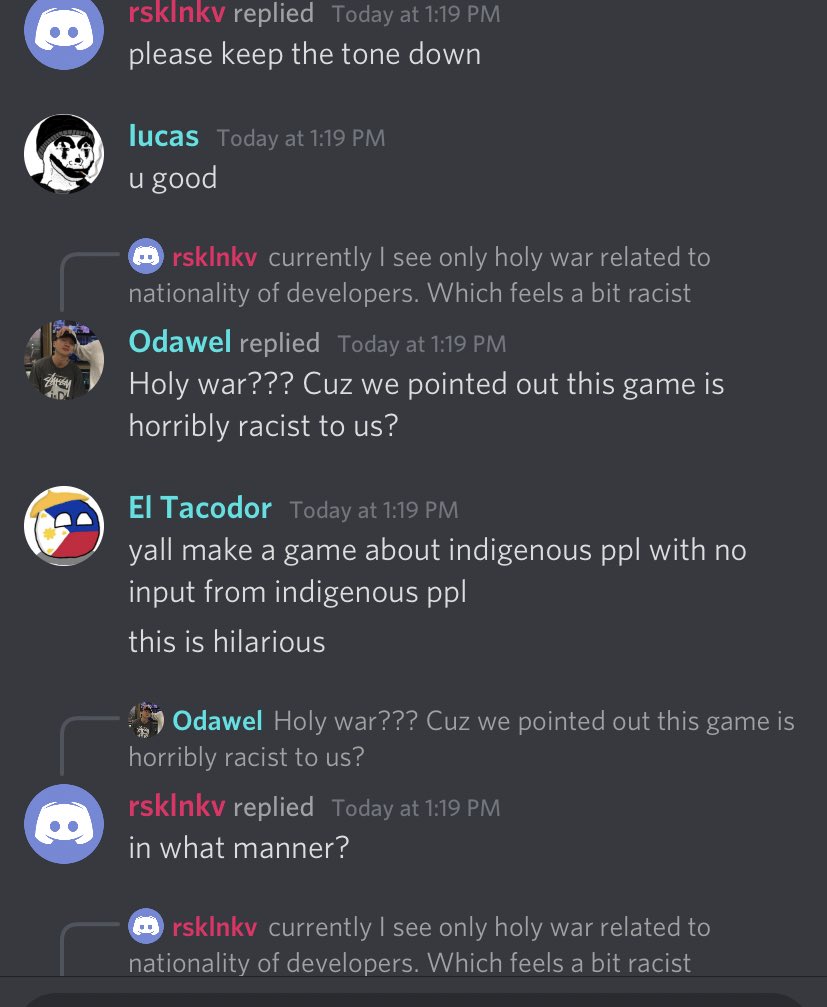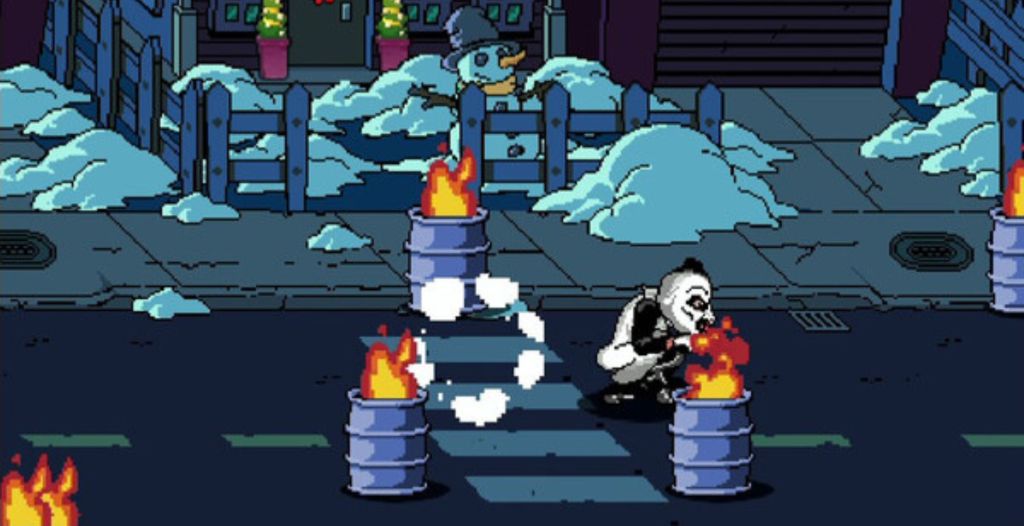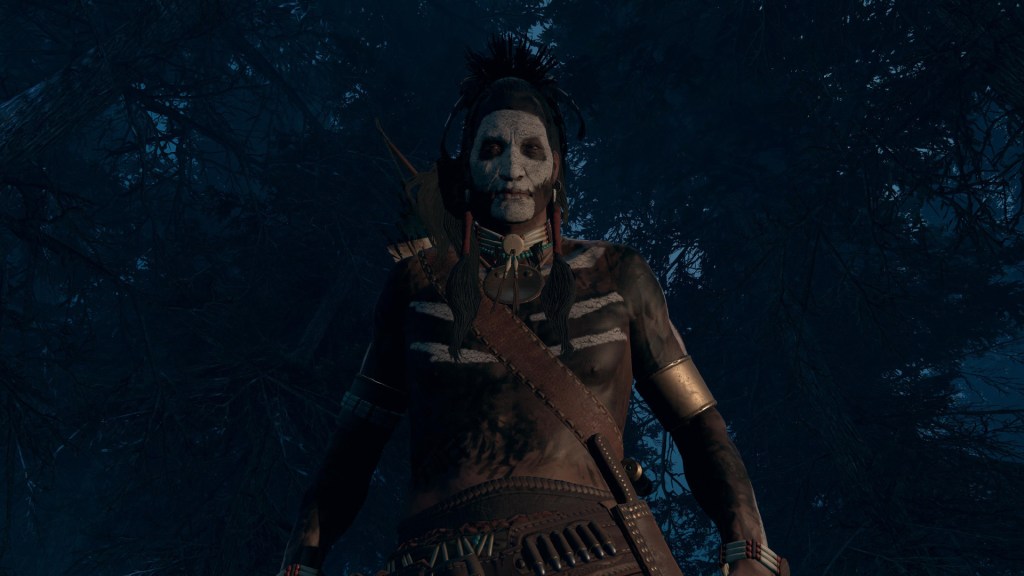Set in a 19th century-inspired Western setting, This Land Is My Land, an early access indie game released in 2019, gives players the role of a First Nations Chief trying to protect his people from the European settlers. The trailers include footage featuring the Chief character in question armed and attacking settlers. To Native people such as myself, this could very much shake out to be a strangely cathartic experience to play through. Perhaps a little dark and violent for some, but cathartic nonetheless!
But the game has made itself a poster-child for how Native experiences are appropriated and misrepresented by people who see them as fodder for novel entertainment. This week, the gap between the game’s purported sympathies and its developers’ processes and behavior was made starkly apparent.
Videos by VICE
Developer and publisher Game-Labs, which received the “Best New Release of 2019” Steam award for This Land Is My Land, is mostly known for independent war and naval combat games. The team working on This Land describes itself as a team of four based in Ukraine. A tweet from the game’s official account, posted in response to a server and game update on April 7, 2021 also made clear that this team doesn’t include any indigenous people.

“Though we have no indigenous people in our development team, we have some in our community,” the now-deleted tweet read.
After combing through the team’s own Reddit AMA, Discord server, and Twitter account there is no mention or sources of Indigenous voices. When asked about specific possible Tribes or Nations that were consulted, Game-Labs said on its own April 26 Reddit AMA: “In This Land is My Land, there are no specific tribes named, and we do not have plans to do that either. The game is not a simulation game with 100% historical accuracy.”

Games-Labs also explained that This Land “unfolds at a specific place that represents a time when the Native Americans were cornered in making a tough choice of assimilating with the foreign civilization or perish into history.”
As a Native person who has been in many situations online involving harmful messages at the expense of my people, this isn’t exactly new to hear. In my experiences, I have noticed a tendency to address genuine concerns from Indigenous people regarding problematic media with a handwave and “it’s fiction.”
The only issue with that is that Indigenous are real. As in living, breathing and existing in the realm of reality with everyone else. We don’t exist as a toy box full of faceless dolls to project roleplay or LARP fantasies onto.
Game-Labs meant to represent Native people in This Land. It’s all over the marketing. From the flute music in one trailer to the lovingly rendered warpaint and feather headdresses on the characters: The game isn’t using a fictional race of humanoids, it’s using the likeness of my ancestors.
At least, it could be my ancestors. The team of This Land Is My Land left it so vague, it can be any modern Native person’s ancestors. Perhaps, it could be all of ours. With the team at Game-Labs admitting that they didn’t have any Indigenous developer on their staff, but signaling that they were open to criticism and advice, people began to weigh-in with concerns.
What many, including Non-Indigenous voices, were pointing out is how harmful it is to lump all of our cultures into one featureless mass. They’d be correct, as far as my Cree self is concerned. My experiences in my identity and tribe will vary from those from others. Our beliefs and languages are different, our dialects vary. There is no one overarching way to push us together as one, we all deserve to be heard.
This Land is My Land pushes the Indigenous monolith misconception, and has fostered a whole fanbase of gamers who perpetuate this mentality. After joining the game’s community server on Discord, I witnessed other Indigenous people having dialogue with the developer and their community regarding the game’s content.
The conversation was heated, with Native people speaking up about their discomfort. The responses from fans and staff didn’t surprise me—this is not the first time I’ve seen my culture crudely appropriated—but of course I can’t deny my disappointment.
“Add Native people to your development team and actually take into consideration this game is harmful to Native people” said one user in the “feedback and suggestions” channel.
They were rebuffed with endless variations of “Why is this racist?” and “No this isn’t racist” by other users.

One user, “rsklnkv” stands out in the Discord exchanges around this game, because they claim to be the lead developer and invited users to email him at an address that appears to belong to Game-Labs co-founder Denis Khachatran. They exhibited some of the most common forms of bad-faith tactics that you find in discussions around issues that affect marginalized groups.

Confronted with repeated criticism that their game was racially insensitive and uninformed, they fired back demands for evidence and education. It’s exhausting to read, and even more exhausting to debate with, which is why it’s such a familiar way to weaponize the emotional labor of the people most affected. It allows someone to behave in a way that’s offensive to an entire group of people, claim they are innocent by pleading ignorance, and then put the burden of showing why their behavior was offensive on the very group they were offending.”

Seeing all this happen in real time, it painted a broader picture about the team behind this game and the echo chamber it creates. This is a game about Indigenous people and the team boasts about “passion” for Native people, but they are reluctant to believe us when we say their game hurts us.
This Land also has a terrible convention of callings its community “the tribe” and referring to the development team and certain users on the Discord server as “Chiefs.” In other contexts, they address the whole community as “Chiefs.” When asked if they could stop doing this, “rsklnkv” simply said “no.”
As of me writing this, the Discord server and Twitter page has undergone some spring cleaning. Most of the past conversations with Indigenous users have been wiped from their chat logs, and tweets involving the heritage of the game developers are also gone. Most of the direct feedback and criticism from Native voices were on the removed posts and logs.
Looking into the controversy around This Land was admittedly a draining experience for me. While I initially hoped it was a simple misunderstanding, digging has shown me players have been bringing these issues as early as 2018 on the Game-Labs forums.
If you assumed a good-faith effort on the part of the developers to take their subjects seriously, you could maybe see a flawed-but-cathartic project in This Land. But the community meltdown that ensued in the game’s Discord, and the refusal to entertain criticism by the developer, make the game’s design decisions seem even more dubious.
Much of this game seems to rely on Indigenous trauma, the setting and central conflict itself reflects as much. Though the game developers continuously boast about the in-game goal of This Land being to take back your character’s land… it turns out you are punished for actually doing so.
This Land contains a game mechanic called Karma, which does lead to consequences in the storyline if the player decolonizes a little too much. You get bad karma when you kill settlers or even their livestock, and instead seemingly you’re encouraged to intimidate or stun them. This is odd because there’s a whole gameplay trailer dedicated to just the violence and kill screens you can do on your enemies, much of the marketing seems to lean into glorifying this violence. On January 6, the team even asked if bows and arrows or tomahawks are players’ prefered weapons. I am not sure why it matters, seeing as the game chooses to punish those who use them with bad “Karma”.
Consequences for bad Karma include affecting trade deals, allies not wanting to join the resistance you are building, and overall increased hostility from other characters. Now lots of games include this type of risk/reward decisions in an attempt to introduce a fun challenge. But This Land’s solution is to punish you for being too much of a “violent Indian”, and this is a familiar trap.
On the one hand, your cause is just and your lands are being invaded by genocidal settlers, and you can unleash brutal violence on them with your tomahawk. On the other hand, you shouldn’t kill them. Or their farm animals. Otherwise you’re a brutal murderer and the entire world will become more hostile, including other natives or even the wildlife. The game sets a moral limit on your resistance, and punishes you for transgressing it. Whether This Land knows it or not, this was part of the endgame of colonial occupation and the justification for the controls and sanctions imposed on tribes across North America. Given this context, the implications of this “karma” system cause me to raise my eyebrows.
It’s clear now that the team behind This Land is My Land had no Native consultation, despite creating a game that profits from a traumatic part of our history. It’s the old game of “cowboys and Indians,” and while it’s ostensibly on the side of the Indians, it’s disrespectful of the actual people and their history at every turn.
There are countless Indigenous creatives trying to tell our stories. This Land could easily have found and involved any of them from the start instead of, by their own admission, drawing from other media depictions of the Native experience—a poisoned well if ever there was one. At the very least, Game-Labs could have listened respectfully to their criticism at any of the many junctures where it was offered, and taken action.
Instead they’ve done actual harm. Not just with their game itself, but by creating yet another racist online community that, to borrow another loaded but apt metaphor, circled the wagons against criticism from the Indigenous people whose identity they fetishize, consume, and sell for profit. I’ve witnessed actual Indigenous people being silenced and bullied for speaking up and I have no doubt the same will happen to me. This Land might be a game about Indigenous resistance, but as a product it is by and for settler culture.
Game-Labs has not responded to a request for comment.
More
From VICE
-

Screenshot: Konami Digital Entertainment -

Screenshot: Square Enix -

Screenshot: Selecta Play -

Photos By Konami
